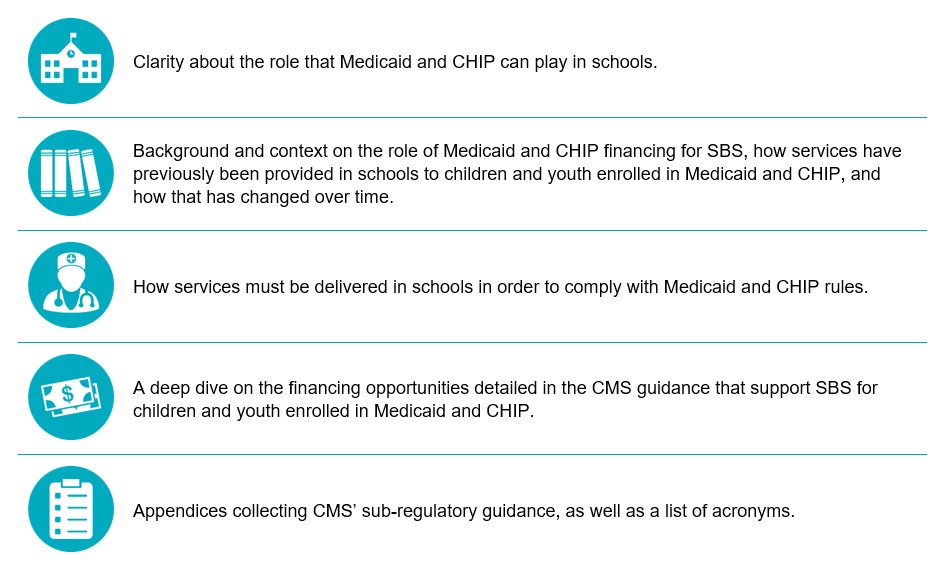Editor’s Note: In a new issue brief, Manatt Health summarizes the Centers for Medicare & Medicaid Services’ (CMS) new guidance on Medicaid and Children’s Health Insurance Program (CHIP) services in school-based settings and highlights implications for state agencies and local partners. The brief, summarized below, helps demystify reimbursement and funding opportunities for school-based services (SBS) and supports providers, advocates and anyone else with an interest in SBS. Click here to download a free copy of the full issue brief and reach out to Zoe Barnard (zbarnard@manatt.com) and Jocelyn Guyer (jguyer@manatt.com) if interested in discussing how Medicaid and CHIP can support SBS.
On May 18, 2023, CMS, in consultation with the U.S. Department of Education (DOE), released new guidance to support state Medicaid and CHIP agencies, state education agencies,1 and local education agencies2 in working together to deliver covered Medicaid and CHIP services in school-based settings. These school-based services (SBS) are critical health and health-related services provided to students and their caregivers in the school setting, and can be covered by Medicaid and CHIP. This guidance, Delivering Services in School-Based Settings: A Comprehensive Guide to Medicaid Services and Administrative Claiming, was accompanied by a CMS Informational Bulletin (CIB) summarizing the guidance for states and announcing the launch of the joint CMS and DOE SBS Technical Assistance Center.
With this new guidance, CMS highlights that schools can and should play a critical role in providing health care services to children and youth and seeks to make it easier for them to do so. Medicaid and CHIP have a powerful role to play here, given that 42.1 million children, or over half of all children in the United States, are enrolled in Medicaid and CHIP.3 The guidance focuses on:
- New reimbursement rates and payment flexibilities, including the option to pay higher reimbursement rates for services provided in schools.
- New options for interim or monthly payments to schools.
- Inclusion of early childhood educational settings and best practices in service delivery to young children, including mental health consultations.
- Encouragement to states to expand the role Medicaid and CHIP can play in financing health care services for all Medicaid- and CHIP-enrolled students, not only those students who receive special education services.
- New flexibility for setting-specific provider types.
- Emphasis on the ability to cover the full cost of outreach and enrollment activities for Medicaid and CHIP, regardless of the share of children who ultimately are found eligible for these programs.
- Ways to use CHIP Health Services Initiatives for SBS, including for substance use prevention and harm reduction initiatives.
Manatt’s new issue brief provides:

1 Also known as state departments of education.
2 Local education agencies are defined as “a public board of education or other public authority legally constituted within a state for either administrative control or direction of, or to perform a service function for, public elementary schools or secondary schools in a city, county, township, school district, or other political subdivision of a state, or for a combination of school districts or counties as are recognized in a state as an administrative agency for its public elementary schools or secondary schools.” See 34 C.F.R. § 303.23(a) here.
3 CMS. March 2023 Medicaid & CHIP Enrollment Data Highlights. Available here.